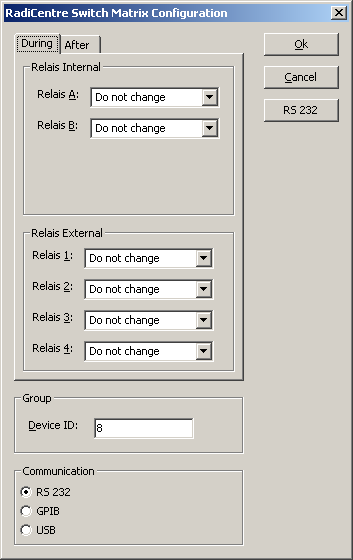How to configure the RadiSwitch: Difference between revisions
| Line 5: | Line 5: | ||
=== During and After === | === During and After === | ||
There are two situation where it is possible to specify the switch configuration. These two situations are during and after the test. The setting during the test is send to the switch matrix just before the test is started. The setting after is send to the switch matrix after the test has ended. The idea behind it is that the setting during and after the test can be completely different. A possible situation is that the input of the analyzer needs to be switch from the antenna to be sure that it is not blown up. Another possible scenario is that the high power amplifier is switched to a dummy load to be sure there is no RF power in the chamber. | There are two situation where it is possible to specify the switch configuration. These two situations are during and after the test. The setting during the test is send to the switch matrix just before the test is started. The setting after is send to the switch matrix after the test has ended. The idea behind it is that the setting during and after the test can be completely different. A possible situation is that the input of the analyzer needs to be switch from the antenna, after the test has ended, to be sure that it is not blown up. Another possible scenario is that the high power amplifier is switched to a dummy load to be sure there is no RF power in the chamber. | ||
Revision as of 13:26, 13 October 2009
Configuring the RadiSwitch[edit]
This tutorial is written for a 2 port switch but is the same for all the others.
During and After[edit]
There are two situation where it is possible to specify the switch configuration. These two situations are during and after the test. The setting during the test is send to the switch matrix just before the test is started. The setting after is send to the switch matrix after the test has ended. The idea behind it is that the setting during and after the test can be completely different. A possible situation is that the input of the analyzer needs to be switch from the antenna, after the test has ended, to be sure that it is not blown up. Another possible scenario is that the high power amplifier is switched to a dummy load to be sure there is no RF power in the chamber.
